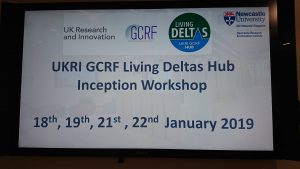In this statement on behalf of the Oral History Collective, Graham Smith, Professor of Oral History at Newcastle outlines some of the challenges and possible responses that oral historians face during the COVID-19 crisis. He argues that oral historians need to go beyond the technical challenges of remote working and think about the political crisis arising from the COVID-19 pandemic. In doing so, he warns against oral historians supporting stereotypical and dangerous attitudes to older people, and outlines the Collective’s local and international strategy.
Graham would like to thank Oral History Unit colleagues for their early input and Collective members who commented on the draft. Graham notes: ‘Any errors or mistakes are his alone’.
Continue reading
 nd collaborative partners in history and oral history that will explore popular memories of environmental change across three of the world’s major delta regions. Here Graham reflects on just why the project is so exciting.
nd collaborative partners in history and oral history that will explore popular memories of environmental change across three of the world’s major delta regions. Here Graham reflects on just why the project is so exciting.